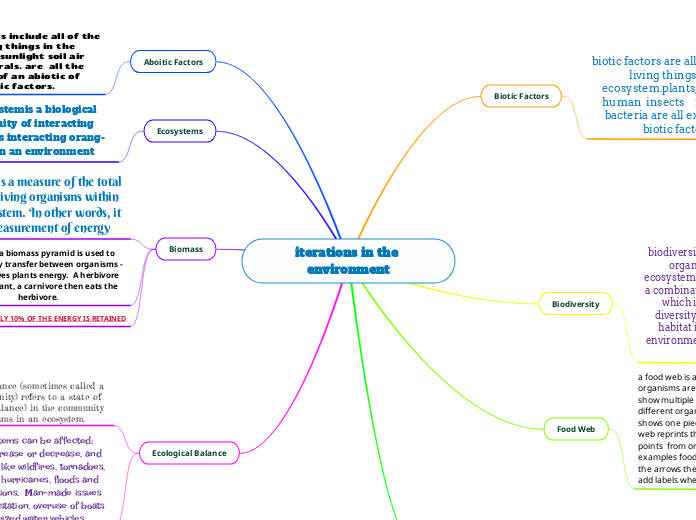iterations in the environment
Biotic Factors
biotic factors are all of there non living things in an ecosystem.plants, mammals human insects fungi and bacteria are all examples of biotic factors.
Biodiversity
biodiversity is the rarity of life and organisms in a habitat or ecosystem. The word biodiversity is a combination of the words biology which is the study of life and diversity which mean variety. A habitat is the natural home or environment for a plant, animal, or organism.
Food Web
a food web is a digram that shows how organisms are interconnected food web show multiple connections between different organisms while food chain only shows one piece of a food web. on a food web reprints the flow of energy the arrow points from organisms that eats it. examples food web included below draw. the arrows the pointing in the deretions add labels where necessary.
Primary vs Secondary Succession
Succession is a series of changes in an ecosystem over time.
Primary Succession: When new land is formed or bare rock is exposed creating a place for a new habitat.
Secondary Succession: When a previously occupied area that has been affected by a disturbance that killed all or most of its community is developed into a habitat.
Aboitic Factors
abiotic factors include all of the non living things in the ecosystem. sunlight soil air rocks minerals. are all the examples of an abiotic of abiotic factors.
Ecosystems
an ecosystemis a biological community of interacting organisms interacting orang-swims in an environment
Biomass
biomass is a measure of the total mass of living organisms within an ecosystem. In other words, it is a measurement of energy
Example: a biomass pyramid is used to show energy transfer between organisms - The sun gives plants energy. A herbivore eats the plant, a carnivore then eats the herbivore.
ONLY 10% OF THE ENERGY IS RETAINED
Ecological Balance
Ecological balance (sometimes called a climax community) refers to a state of equilibrium (balance) in the community of organisms in an ecosystem.
How ecosystems can be affected: Population increase or decrease, and natural causes like wildfires, tornadoes, earthquakes, hurricanes, floods and volcanic eruptions. Man-made issues include deforestation, overuse of boats and motorized water vehicles.
